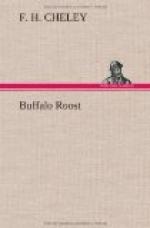“What’s the bunch going to do on Wednesday night?” inquired “Sleepy” Smith, who was always preoccupied when anything of real importance was going on.
“Why, you ought to wake up occasionally and you wouldn’t be so far behind the times,” replied Chuck, rather dryly. “The class is going to Sweet Potato Gulch for a business meeting and wiener-bake. Be sure to be on hand, every man of you.”
“O well, I don’t like wieners, anyway,” replied Smith, and he returned to his own thoughts.
* * * * *
Wednesday night was perfect—not a cloud in the sky, and a great half-moon to help them find their way. There was a spring breeze in the air, the kind that makes a great wood-fire of dry logs and pine needles about the most attractive thing on earth to a crowd of young savages. Far away to the westward Pike’s Peak’s hoary head was lifted into the sky, dimly lighted by the yellow rays of the moon. There was a faint odor of spring in the air, while the little mountain stream had not as yet given up its icy prattle. Little patches of snow still dotted the sides of the canyon, and here and there a crystal icicle sparkled from the end of a pine bough.
It was a night of wonders for Willis. He had never felt the “call of the wild” so strongly and irresistibly as on that night. Every mountain crag seemed to be calling him, and in his fancy he thought the fir trees reached their gently-waving branches, beckoning him to come into the darkness and solitude. In spite of himself, his thoughts would wander to the Michigan homeland. He wondered if the ice had broken on the lake yet, and if the blossoms had begun to come in the old orchard, and if his grandmother had filled the incubator. He felt queer with so many strangers, yet not at all ill-at-ease, for he had lived a wholesome life in the out-of-doors, and the meaning of fear was almost unknown to him. As the fire was lighted and the wieners set to bake on the end of long, green willow sticks, he began to enter more completely into the merriment of the crowd.
It was an exceptional group of older fellows—the clean fun and wholesome chat was above the ordinary, yet was spontaneous and real. The “Chief,” whose name was Allen, stood at one side of the fire with a note-book in his hand, while the fellows were seated upon a dead log that had been dragged close to the fire. Allen was a young man of medium height, well-built, and clean-cut. His hair was black and his eyes were dark and very bright. A merry smile played over his features. Every fellow in the group knew that that smile meant “good will toward men.” His hiking trousers bagged about the tops of his high mountain boots, and his sweater bore the marks of many a camping trip. He always wore on such occasions as this an old felt hat, which had the initials of many a stanch, good, out-of-door companion printed on it. There was the color and vigor of health in his face, and his




